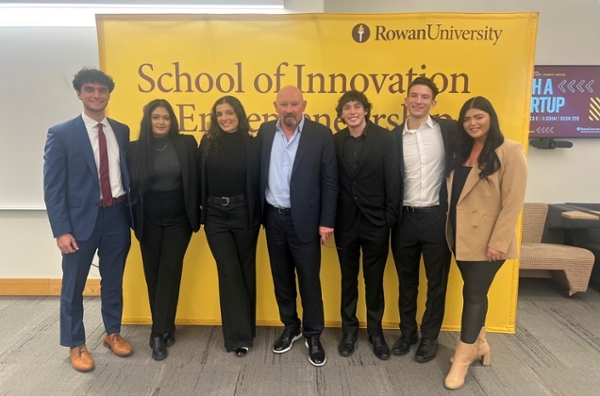A leader in global trade, CEO Neal Asbury returns to Rowan to mentor and inspire
A leader in global trade, CEO Neal Asbury returns to Rowan to mentor and inspire

Profoundly affected by undergraduate study abroad in Europe, music major Neal Asbury ’79 decided to follow a different beat: a career in international trade.
And did he ever.
Asbury, who returned to Rowan University this semester as Professor of Practice and Entrepreneur in Residence in the Rohrer College of Business (RCB), is chief executive officer and founder of The Legacy Companies, a global leader in the manufacture and distribution of kitchen appliances and food service equipment.
Beneath the umbrella of The Legacy Companies resides more than a dozen highly successful businesses including Chef’s Choice, with its line of world-class knife sharpeners; Maxx Cold, which makes commercial refrigeration equipment; and West Bend, a popular consumer brand that produces a wide range of products, from coffee makers and blenders to air fryers and bread makers.
Asbury’s path to success, from undergraduate music major to CEO, was hardly a straight line, but he believes if he can do it, anyone can, and he’s returned to Rowan to teach others how.
“It starts with passion,” Asbury said during a recent tour of campus. “And the earlier you discover your passion, the more time you have to perfect it.”
Though he played piano well enough for acceptance into then-Glassboro State College’s prestigious music program, Asbury said he started playing relatively late, around age 14, and spent countless hours in practice trying to catch up.
Though his diligence did not lead to a career in music, it taught him the value of working through obstacles and of never giving up – invaluable lessons for a career in business.
Indelibly changed by his year of study abroad, Asbury determined to make travel and business his life’s work.
“I decided I was going to get into international trade. I didn’t know how, but I was going to do it,” he said.
Importance of mentorship
Following graduation, while sharing a tiny apartment in New York City’s Hell’s Kitchen neighborhood, Asbury answered a New York Times ad for an entry-level position at H.D. Sheldon & Co., an international distributor with an equity stake in the commercial ice maker company Kold Draft, but the hiring manager thought he was overqualified.
“I said I wanted it. I really wanted that job,” he recalled.
Regarding Kold Draft, he said, “lo and behold, after 25 years I ended up owning it.”
At H.D. Sheldon, Asbury learned how valuable a mentor can be. About a year after starting with the company, an employee who was informally mentoring him recommended him to another employer who was looking for a salesperson in Asia, and it changed his life.
“Within a couple of years after leaving Rowan, I was travelling around Asia on an expense account. My job was to take people to dinner, wine and dine them, and get them to buy stuff,” he said.
His work in international trade took Asbury to some of the world’s most exotic locales – Indonesia, Singapore, the Philippines – and he soon found that it wasn’t just the travel but the thrill of the deal that drove him. Before long, he was not just selling product but buying and selling companies.
“To be an entrepreneur you have to be gutsy,” he said. “You have to put yourself in situations where maybe you’re in over your head, a little uncomfortable, and I first learned to do that at Rowan.”
The drive from within
Based in the RCB, Rowan’s entrepreneurship program is affiliated with schools and colleges across the University, including the Henry M. Rowan College of Engineering and the Ric Edelman College of Communication & Creative Arts, with further collaborations under development. And that’s how it should be, Asbury said.
“Entrepreneurship comes from everywhere,” he said. “You don’t have to be a business student to be an entrepreneur, it’s something that’s inside you.”
It’s a lesson he’s already begun sharing on campus.
“The most important thing is to find something you’re passionate about, and to find a mentor,” he said. “Find an industry that excites you, and someone who you can learn from.”